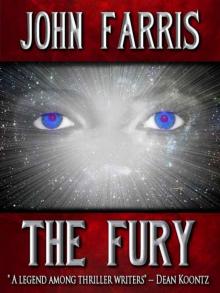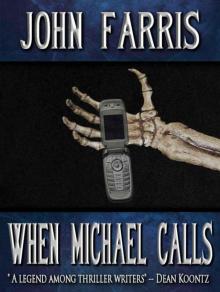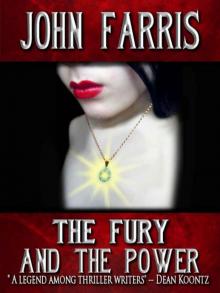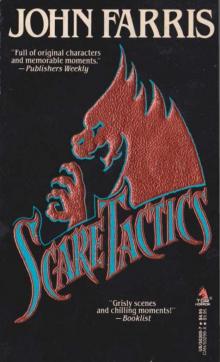- Home
- Farris, John
Captors Page 14
Captors Read online
Page 14
"Baked eggs? Buttermilk pancakes?"
"Wonderful," Sam said. He sat down at the table, looking at the dark fireplace. Felice went happily to work. "Almost cold enough for a fire this morning."
"Sam?"
"Hmm? Sorry, I was nodding."
"What did you think when you first saw Carol? I mean, when the police brought her home the other night?"
"I remember thinking I needed another drink. My heart kept squeezing up into my mouth like a plastic beach ball."
"How did she—look to you?"
"Terrible. But she was alive, which is all I cared about." He studied her. "Why?"
"I don't know—I keep reliving it. They brought her in, and for a minute she couldn't place us. She tried to smile, but her eyes—"
"She was out on her feet."
"I know. It was just—awful in a way I can't describe. I didn't know what to say."
"You were fine."
"I still feel strange around Carol. I seem to be—fumbling for an attitude. She's aware of that. Either I'm oppressively Mom or else I sound as phony as all the bright chattering types at a bridge luncheon. It's ridiculous. What's wrong with me?"
"We all have to settle down. Takes a while."
"I guess it does," she said glumly.
It was a big house and it seemed unexpectedly lonely without Kevin tromping around, two or three friends in tow. For Carol's sake Felice tried to be there as much as possible, but there were demands on her time she couldn't refuse: a little charity work, visits to a friend recovering from major surgery in Grasslands Hospital, an afternoon of bridge, some shopping. Sam had his talk with Gaffney: the investigation was plodding, going nowhere. The FBI man agreed that there was very little more Carol could help them with.
Carol went hawking with the General, sunned herself by the pond until she was the color of still warm beer, took long solitary drives in the Sting Ray, glanced restlessly at television, stayed awake half the night playing favorite records—Barber, Shostakovich, Bruckner, Ives, Janis Joplin, Wes Montgomery—and kept the flower beds weeded for Joseph Dowd. She bruised her foot on a stone and couldn't play tennis. Her appetite was uncertain. She lost more weight. The bruise on her neck became less distinct, faded altogether. She smiled readily but there was little laughter in her; she lacked those unexpectedly gay and gabby moments which Felice treasured and desperately missed.
They would sit together, in the kitchen after dishes or on the screened side porch with the sprinklers whirling in the dusk, and talk. Each time Felice would think she had the key. But the key never quite fit and Carol remained locked up in herself, inexpressibly remote.
On Saturday, Sam went in to tape a panel-discussion show for National Education Television. Felice picked him up at the station that afternoon. His suit was wrinkled and he looked hot and undelighted with himself.
"Hi," she said, kissing him. "How was it?" He slumped beside her in the Mercedes. "The infighting got a little bloody and nothing useful got said. We'll see it next week, Thursday, I think."
"Would a gin sour cheer you up?"
"Like nothing else in this wide world."
"I have to pick up a couple of things at the shopping center in Mount Kisco."
"No hurry. How's Carol?"
"The same."
''Oh.
"She needs somebody desperately. Like Dev."
"Has she mentioned him?"
"No. But I'll bet she's thinking about him just the same."
"Somebody else will come along," Sam said. "We could try talking her into a movie tonight. If she can't have Dev maybe Paul Newman would divert her for a couple of hours."
"She's not the only one," Felice said, grinning.
The parking lot at the shopping center was jammed. Sam volunteered to run in for the steaks she'd ordered. Felice circled slowly, waiting for a place to park. Traffic was sluggish, disorganized, slightly hazardous. Ahead of her a woman with too many kids in a gypsy-looking station wagon had fouled herself up trying to maneuver into a narrow space. Felice was boxed in. She mentally called out signals to the frustrated wagon driver but the woman hit another car anyway, leaving paint on a bumper and adding a new fender dent to her collection.
She saw Carol.
In a phone booth in front of the Rexall, no more than a hundred feet away.
Apparently it wasn't a happy conversation. She was listening. Her jaw was set. Her back was arched like a combative cat's.
Scowling, she took her turn. She raked at her blonde hair with the fingers of her free hand. For a few moments she seemed to be shouting; her face was contorted. Then she turned in the booth and Felice couldn't see her face anymore.
The woman in the station wagon extricated herself and took off in a despairing fog of blue exhaust. Felice was able to move ahead a few yards.
When she glanced at the telephone booth again she saw that Carol had emerged and was staring directly at the Mercedes, but the sun was in her eyes. Felice was startled by the look of heavy-lidded hostility and feral outrage on her face just before she slipped on a pair of big sunglasses. Felice watched her jog down a couple of steps and cut across the asphalt, hair swinging, lips pale from some kind of sunburn cream. She was walking at an angle away from the Mercedes. She hopped into her blue Corvette without opening the door, started it, backed out imperiously, roared away, hand on the wheel, hand on the stick. Somehow she found the holes she needed in the bogged-down traffic. She charged through them recklessly enough to scare several people. She caught the light on the highway, preempted a lane, zoomed north.
Sam returned sooner than Felice expected, spotted her, hurried over.
She was going to mention Carol to him; she decided it wasn't that important. But something else had blocked her. There was too much she would have liked to explain to herself, and couldn't. Mostly she wished she knew who had so thoroughly enraged her daughter. She had not liked that look on Carol's face, the brute, insensible anger. She had never seen Carol like that and the memory stayed with her, oppressively, most of the way home.
While Sam showered and changed clothes she mixed drinks and carried them to a long porch overlooking a graceful lawn, a variety of flowering trees and shrubs—glossy abelia, Scotch heather, cinquefoil, Japanese tree lilac and a stately golden rain tree. There was just enough breeze to tremble the leaves of the slim birches at one corner of the porch. She sat down in a favorite basket chair to read a dutiful and maddeningly uninformative note on a postcard from Kevin.
Sam came down in a faded pullover shirt and boat denims, the hair on the back of his neck feathery from moisture; he was cooled, glowing, hugely pleased. Without a word he dropped a fat blue envelope with a travel agent's logo in her lap. She glanced at him, bemused, opened the envelope. Airline tickets, hotels, ground transportation in one package.
"Paris," she said wonderingly, "Amsterdam?"
"Rome too if we feel like it. If you get bored with Paris and Amsterdam."
"Sam! When?"
"We leave the fifth of September for four weeks." The arrangements he had made were flexible. He'd bought a good guidebook, detailed maps. They spent the rest of the afternoon going over them. They drank several of the gin sours apiece. At five-thirty Sam put the steaks on the outdoor grill. Carol came home a few minutes later, banging the front screen. She came into the kitchen with her shirttail out, waved at them, opened a can of Coke. She kicked off her sandals and joined them outside. She'd been swimming at the Club, she told them. Chlorine in the pool had reddened her eyes.
"Smell that steak! You two look pleasantly smashed. What's the occasion?"
Felice, eyes glowing, told her. She kissed them both soundly and wandered off, whistling for Riggs, who was flipping a turtle over and over at the edge of the dusky pond. Felice watched, sober enough to be impressed by her obvious good spirits but remembering the other face, the look of the savage. But it was a very special day, she was not going to let anything bother her. She got busy with the salad. Despite her protests
Sam made off with her half-empty glass and brought her a fresh drink. Felice shook her head in mock dismay, happier than she'd known how to be in months.
They gorged on steak, salad, potatoes stuffed with tiny shrimp and rebaked with a cheese topping. They laughed a lot in the kitchen, which was lighted by the fading sun. Carol laughed easily for once, and it was good to hear. Felice was too happy most of the time to be absolutely sure of what the conversation was about. She looked at Sam often, with an undoubtedly fatuous smile she couldn't seem to get rid of.
"More steak?" Felice asked Carol, who patted her stomach and groaned.
"No, thanks. Oh, I forgot I had some news."
"What, dear?"
"These two boys I know. They're SDS at Berkeley. I heard from them today; they're coming east for—I don't know—strategy meetings, I guess, to prepare for the demonstrations during the Chicago convention. The Festival of Chicago it's going to be called. The boys have had a tough trip and they wanted to know if I could put them up here for a few days before they get down to business in the city."
"A pair of wild-eyed revolutionaries, huh?" Sam said, chomping.
"They aren't just activists, they're egalitarians. They've been known to shave and wear shoes once in a while. And they're fans of yours, Sam."
"Oh, well, that settles it."
"Plenty of room," Felice murmured. "When do you think—"
"Monday, they said." She turned toward Felice; the last direct light of the sun highlighted the planes of her face, turned her eyes to dark crescents. The perfect edges of her teeth were very white against her full lower lip as she smiled.
Felice had a throbbing headache from too much gin. And perhaps she'd eaten too much, she thought uneasily.
Because there seemed to be hidden laughter in Carol's inflamed eyes, a disturbing laughter now, as if she were savoring a mordant joke.
Felice looked away, suddenly feeling drunken and foolish. She was beginning to find it hard to focus.
"Why don't you rest for a while, Mother? Watch television? I'll clean up."
"Oh, Carol, I couldn't let you . . ." The voice seemed to come from somewhere to the side of her.
"I insist," she said, still smiling. "I really do insist, Mother."
Like so many calamitous dreams it began innocently.
A favorite plaything of childhood had been the glass paperweight.
Shake it vigorously and there was a blizzard inside.
Hold it upright in two hands and the blizzard became a gentle fall of snow, covering evergreens and a miniature cottage with a red roof.
See the lighted window?
Yes, I see it, Felice replied, gazing solemnly into the crystal.
Look close. Do you see the little girl snug in her bed in the cottage with snow on the roof?
Oh, yes!
Time for you to be snug in your own bed, Felice.
Please can I keep it? she said in her dream voice.
Yes, if you want to. Lie down now, and I'll cover you up. Are you warm enough? Hold the crystal tight and sleep well. Sweet dreams, Felice.
Good night, Carol, she said. Good night, Sam.
Good night, he said, so tall and smiling down from the foot of the bed.
Felice yawned. And in the morning we'll all go to Paris, she said.
Dream Carol reached for the lamp. Lights out. Lights out! Felice repeated, happily.
She clutched the paperweight protectively. And the snow continued to fall all around while the little girl lay secure in her childhood bed.
The shape of her room became the shape of the crystal, expanding and contracting comfortably, like a glass balloon, with every breath. There were no more straight lines, only curves diversely in motion around and above her, responding to key changes in music felt but unheard, shimmering with the incandescence of the moon's track on dark water. At times they assumed vaguely human shapes. This phantasmagoria seemed odd to her but it wasn't alarming, no, not as long as the child slept untroubled in her loving hands.
But somehow she'd been neglectful; a change had taken place inside the paperweight. Snow was no longer falling. The glass felt hot to the touch. Felice shook it anxiously. The cottage bloomed with flame.
She stared at it, astounded, frightened. Then she scratched at the impenetrable glass with her fingernails. The crystal grew hotter. A sob hung in her throat. The child would wake, the child would burn—her fault.
She must take it to Carol. Carol had given the paperweight to her; she would know what to do.
Felice slid down the long, long slope of the bed to a banked floor, made her way to the door: it bulged wide, like a noose, to let her through. Down a prism hall lined with mirrors of ice and landscapes melting off the walls, up a complicated stair. The crystal burning, burning, inspiring panic. She screamed and heard chimes, ending in a dull cough of machinery: wogglewogglewoggle, with a tricky echo fading into nothingness. Silence then, except for a little girl crying helplessly.
At her touch the door to Carol's room swung slowly—like a monument falling off its pedestal. There was a roaring-out of light and sound that transfixed her.
Carol stood before her. Naked head to toe. Hair in a love-nest tangle. There were bold finger marks on plump breast hemispheres. The humidity of passion had collected in the hollows of her seething umber eyes. Sexual anxiety: her fingers hooked like claws. Felice felt shrunken before her, craven. The crying of the child had become a thin wail, all but unheeded.
What do you want? Spoken sharply.
What do I want? Felice thought, at a loss. Numbly she held up the paperweight. Surprised to see it was not a paperweight after all. Just a round drinking glass. She held it in front of her face. Carol, seen through the glass, bulged fatly, like an Indian carving of a fertility goddess.
Smell of blood in the room, as vivid as the smell of burning had been to her. Cut at one corner of Carol's mouth, a pink tone smeared on one exposed white tooth. Carol smiling, flat-lipped, not pretty. Music, not meant for her ears, a coarse earthy shouting female voice, a drumming and squalling that lived in the blood. Panic again, electronically renewed. Fertility music. Behind Carol, so far away on the outcurve of the glass, a man was sprawled on the bed. Sam. Startlingly tumescent. What do I want? Felice asked herself, thoroughly dazed.
It isn't snowing anymore, she explained humbly.
Carol came closer, looked unlovingly at her. Felice trembled. But Carol relented and stroked her cheek gently with her fingers, quieting her.
She smiled, a benign smile. Now look! she said. It's snowing again. And Felice looked as she had been told and there was the paperweight, the trim little cottage, everything just as it had been. While Carol stroked her cheek calmingly she continued to gaze at the stylized winter scene. She didn't hear the wild music anymore. Carol had mentioned that she needn't hear it if she didn't want to.
I'll take you down, Dream Carol said at last. There's no reason for you to get out of bed again. Nothing to worry about.
No reason, Felice repeated drowsily, watching the snow sift down. But she thought she could see the naked man again, and that bothered her. So she did the sensible thing and put him firmly out of her mind.
I'm not worried, she said sweetly, and went down to her bed hand in hand with Carol. Everything was familiar now, in its place. She held the paperweight, which had always been her very favorite, next to her heart.
Chapter Fourteen
Sunday, July 7—Monday, July 8
They picked him up as soon as he entered the International Arrivals Building at JFK; he had come in from Lisbon on Swissair. It was a hot Sunday night and the overburdened airport was having one of its classic jams: planes were landing two hours late from the stacks overhead and customs was clogged with weary waiting people.
"Dev Kaufman?"
Dev stopped and looked tiredly at the two men. "Yes," he said.
"FBI, Mr. Kaufman," the spokesman said, showing his credentials. "My name is Crockett. This is Mr. Hirsch of the Immig
ration and Naturalization Service. If you'll give him your passport and luggage claim checks he'll clear you through customs. In the meantime we'd like to talk to you."
"Why?"
"That'll be explained, Mr. Kaufman. We'd appreciate your cooperation. It shouldn't take long."
Dev studied them curiously and unworriedly, shrugged, handed over his passport. He was toting an expensive-looking leather bag with a wide shoulder strap. It was somewhat like an old-fashioned mailman's pouch, but smaller and more stylish. Under his other arm he carried an artist's sketch portfolio.
"This is all the luggage I have," Dev explained, slapping the bag.
"Keep it with you." Hirsch smiled and turned away. Dev went along with the FBI agent to a small unmarked office in the depths of the building. Another man was waiting there: a homely mellowed Irishman who looked like nothing else in the world but a cop.
"Mr. Kaufman, this is Special Agent in Charge Robert Gaffney."
"Hi," Dev said disinterestedly, shaking hands. He eyed a tape recorder on the desk. The room seemed little used. The floor was dirty. Some sheets of paper were curled and yellowing on a bulletin board. "What's this about?"
"Please sit down, Mr. Kaufman," Gaffney urged.
Dev hesitated, then put his belongings down and took the offered chair. He was tall and lean with a lot of reach, a bright-eyed boy slowly peaking to maturity. His hair was unkempt but not untidily long. He had big ears and a small nose and a look of introverted compassion. He wore the traveling costume of semi-indigent youth—old chinos, scuffed work shoes, a khaki jacket over a blue Madras cotton shirt. The clothes were clean and he was clean.
Crockett got the tape recorder ready. Gaffney gave Dev a cigarette, sat down to light his own.

 Sacrifice
Sacrifice Wildwood
Wildwood Fury
Fury Captors
Captors When Michael Calls
When Michael Calls Fury and the Power
Fury and the Power Dragonfly
Dragonfly Scare Tactics
Scare Tactics